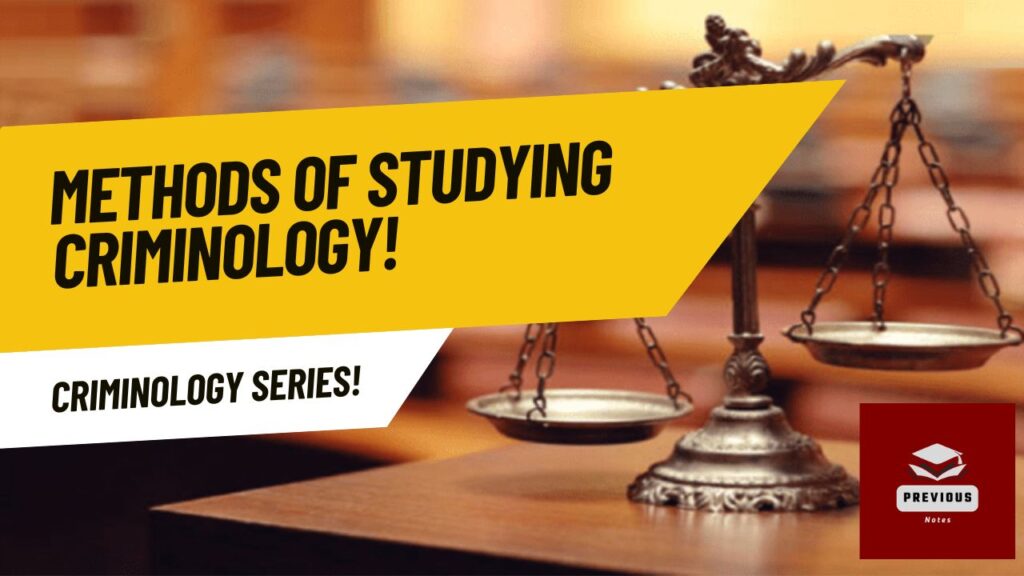Methods of Studying Criminology
Criminology is the science or study of crime. It is concerned with the conduct of individuals which isprohibited by society and law.Criminology is a combination of two Latin words:
Crimen – crime
Logus or logy – science
It is the science or study of crime. It is concerned with the conduct of individuals which is
prohibited by society and law. It is a socio-legal study which seeks to discover the causes of
criminality and suggests appropriate remedies.

Statistical Method
- Purpose: To examine patterns of criminal behavior, test hypotheses, and make inferences about populations.
- Application: Involves the collection, analysis, interpretation, presentation, and organization of data related to crime and criminal behavior. Statistical methods help criminologists identify trends, correlations, and patterns in criminal activity.
Scientific Method:
- Purpose: Involves a series of steps that help researchers gather, analyze, and interpret data in a rigorous and objective manner.
- Application: Researchers follow a systematic process, including observation, hypothesis formation, experimentation, data collection, analysis, and conclusion drawing. The scientific method ensures that research is conducted in a structured and replicable way, enhancing the credibility of findings in criminology.
Historical Method
- Purpose: Aims to provide an understanding of how crime and criminal justice systems have evolved over time.
- Application: Involves the examination of historical records, documents, and events related to crime and criminal justice. By studying the past, criminologists gain insights into the factors that have influenced changes in criminal behavior, law enforcement, and societal responses to crime.
Comparative Method:
- Purpose: Involves cross-national, cross-regional, and cross-cultural comparisons to identify similarities and differences in crime patterns and criminal justice systems.
- Application: Criminologists use this method to analyze how various factors, such as legal systems, cultural norms, and social structures, impact crime rates and criminal justice outcomes. Comparative research can inform policy decisions by highlighting effective strategies employed in different regions.
Experimental Method:
- Purpose: Testing the effectiveness of a particular crime prevention program.
- Application: Involves manipulating one or more independent variables to observe their effect on a dependent variable. Criminologists might use experimental designs to assess the impact of specific interventions or crime prevention strategies. Randomized controlled trials (RCTs) are common in this method.
Psychological Method:
- Purpose: Understanding criminal behavior, its origins, and potential interventions.
- Application: Utilizes psychological theories and methodologies to study the psychological aspects of criminal behavior. This includes examining factors such as personality traits, cognitive processes, and emotional states that may contribute to criminal conduct. Psychological methods can inform interventions and treatment programs for individuals involved in the criminal justice system.
Case Study Method:
- Purpose: In-depth examination of a particular individual, group, or situation.
- Application: In criminology, case studies involve detailed analysis and investigation of specific criminal cases, criminals, or criminal events. This method provides a rich, contextual understanding of unique circumstances, contributing to the development of theories or insights that may not be apparent in broader statistical analyses.
Clinical Method:
- Purpose: Involves direct interaction, such as patient and client interactions.
- Application: Often used in forensic psychology or counseling within the criminal justice system. Clinicians work directly with individuals, such as offenders, victims, or witnesses, to assess and address psychological issues related to criminal behavior. This method can inform treatment plans, risk assessments, and rehabilitation strategies.
You May Also Like:
Indian Penal Code MCQs Quiz: Section 1 to 5
Indian Panel Code MCQs Quiz on Section 511 and Attempt
IPC MCQs Quiz on Sec. 76 and Sec. 79 | Quiz on Mistake
Practice IPC MCQs online for free (Section 78)
Practice IPC MCQs Quiz for free | Section 81 MCQs | Necessity
Practice IPC MCQs online for free : Infancy (section 82-83)
Specific Principles of Criminal Law | LLM Previous Year Paper 2024 | CCSU
Specific Torts | LLM 4th Semester Previous Year Paper 2024 | CCSU
History and Basic Principles of Criminal Law | Previous Paper 2023
LLM Previous Year Paper 2023 | PRIVILEGED CLASS DEVIANCE
PENOLOGY PREVIOUS YEAR PAPER | LLM | CCSU
LLB Previous Year Paper 2023 | Constitutional Law II | CCSU
LLB Previous Year Paper 2023 | Legal and Constitutional History | CCSU
LLB Previous Year Paper 2023 | Jurisprudence II | CCSU
LLB Hindu Law Previous Year Paper 2023 | CCSU
Euthanasia in India, Right to die with Dignity
Right to Privacy Case Law Mr. X vs. Hospital Z
Federal Constitution Definition and key points
University of Madras vs. Shantabai,1954: Article 12 Case Law
Article 20 Fundamental Right with Case Laws
Article 19 Fundamental Right of Indian Constitution with 10 Case Laws
Article 358, 359 Fundamental rights during emergency
Parliamentary Privileges and Fundamental Rights with Case Laws
Article 14 Fundamental Right with Case Laws
Article 15 Fundamental Right with Case Laws
Article 12 Fundamental Right with Case Laws
DOMESTIC VIOLENCE AS TORT | APPLICATION OF TORT LAW
Crimes without Mens Rea? Statute without Mens Rea.
Definition of crime by various jurists, Criminology
Methods of Studying Criminology
All about Capital Punishment with Case Laws
IMPOSSIBLE ATTEMPT | ATTEMPT VS IMPOSSIBLE ATTEMPT
Difference between Preparation and Attempt
Tests to Determine Attempt and preparation | With Case Laws
Specific Principles of Criminal Law | LLM Previous Year Paper 2024 | CCSU
Specific Torts | LLM 4th Semester Previous Year Paper 2024 | CCSU
History and Basic Principles of Criminal Law | Previous Paper 2023
LLM Previous Year Paper 2023 | PRIVILEGED CLASS DEVIANCE
PENOLOGY PREVIOUS YEAR PAPER | LLM | CCSU
LLB Previous Year Paper 2023 | Constitutional Law II | CCSU
Forms of Judicial Process: Adversarial & Inquisitorial
DOMESTIC VIOLENCE AS TORT | APPLICATION OF TORT LAW
Economic Tort | Business Tort: Application of Tort Law
Crimes without Mens Rea? Statute without Mens Rea.
Leave a Reply Cancel reply